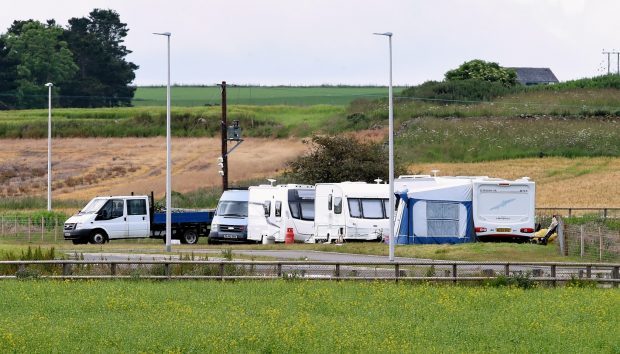A startling new report has revealed there were more illegal travellers camps in Aberdeenshire than anywhere else in Scotland last year.
The local authority’s gypsy-traveller sub-committee will meet today to discuss the findings which show there was a “spike” in unauthorised encampments during 2016, with 61 recorded in the region.
The Aberdeenshire Council figure is the highest of any other area in the country, second only to North Ayrshire which had 58 and Aberdeen which experienced 46.
The Aberdeenshire figure is roughly three times more than those recorded by the majority of Scotland’s wards – which on average reported less than 20 encampments each in 2016.
Last night councillors said the numbers were so high in the north-east as the area was considered an “attractive place” for travellers to find work.
And, with the lack of official sites in the region, it was claimed they were being forced to pitch up at illegal sites if they wanted to visit the area.
Buchan councillor Jim Ingram, a member of the gypsy committee, said: “It’s an attractive area, the north-east, because it’s been a prosperous area. Many of the travellers are travelling tradesmen and they find this a lucrative area to do their work.”
Mr Ingram has previously spoken out about the plan to build a 10-pitch site at Aikey Brae and last night said other sites should also be considered.
He added: “As we build the AWPR I’m sure there will be pockets of land which would be good sites. We’re looking in the wrong place.”
The report comes just weeks after the Scottish Government overruled Peterhead councillors, who blocked plans for a private stopover site near the town.
The figures have also been published as the local authority pushes ahead with proposals to create an official camp at Aikey Brae, near Old Deer in Buchan.
Last night Dave Black, general manager of the Grampian Regional Equality Council, said adequate sites for travellers was a long standing issue in the region.
He said: “A shortage of site provision for gypsy-travellers is a well-established issue in the north-east of Scotland.”
He added lack of suitable stop-offs in the area leads to “a breakdown in relations between communities” and a “lack of trust, prejudice and discrimination”.
Mr Black said travellers also had issues accessing local health services, fresh water, electricity and access to education.
He added: “All of the above has a significant impact on equality. Proper site provision across Scotland is the first step in starting to address the significant equalities and discrimination faced by gypsy-traveller communities.
“Gypsy-travellers, including Scottish travellers, Romany gypsies and Irish travellers, are all recognised ethnic minority groups and have a right to practice a culture which places strong importance on travelling.”
Only five of the country’s 32 local authorities did not report their own statistics as part of the survey.
The report also confirmed that the Banff and Buchan areas have had the most illegal encampments over the past eight years.
A total of 320 camps have been recorded across the north-east since 2009. Of those, 106 have been in Buchan and Banffshire.
The council’s gypsy liaison officer, Jennifer Macrae, said in the report that the numbers for Aberdeenshire were the highest reported anywhere in Scotland.
She added: “All other local authorities who responded had no more than 20 unauthorised encampments during 2016.
“Where the land occupied was privately owned, assistance was offered to the landowner regarding what action could be taken.
“Advice on how to ensure encampments did not locate on the land in the future was also provided if such requests were made by the landowner.
“Regardless of the ownership of the land, the same level of assistance and support was offered to the persons occupying the site.”
Last year 11 groups of travellers had legal proceedings brought against them, although no one was ever convicted of a crime.
The council has said the main reason for employing legal action was that the camps were set up on unsuitable land – including schools or public parks.
In only five cases were eviction orders served – on every other occasion the illegal camps were vacated voluntarily.
Last month, councillors were forced to accept the Scottish Government’s decision to allow a family of travellers to create a private camp site near Peterhead.
Thomas Collins and his family bought the land at Springhill, Boddam, after becoming fed up waiting for a legal site in the region.
And in January Aberdeenshire Council narrowly voted to refuse planning permission to plans for a seven-pitch gypsy-traveller site at Quarry Wood, near Kemnay, yesterday.
The application, which was part retrospective, had been recommended for approval, despite 42 objections.
Afterwards the landowner’s agent, Alan Seath, said the decision would be appealed to the Scottish Government.
Other local authority plans for official stopover sites at Ellon, Thainstone and Laurencekirk have been discarded.
Last November the council agreed to set up a taskforce, in the form of a multi-agency emergency management team, to deal with the region’s most “problematic” traveller camps.
It came after a mess left behind by a group of travellers overlooking Fetteresso Cemetery, near Stonehaven, in October was branded “disgraceful”.
Similar issues had been reported at a site in Maryculter in 2016 which it was said led to “frictions” between the residents of the camp and locals.
Earlier in 2016 the council finally approved travellers site, North Esk Park, at St Cyrus, which was established without planning permission in 2013.
